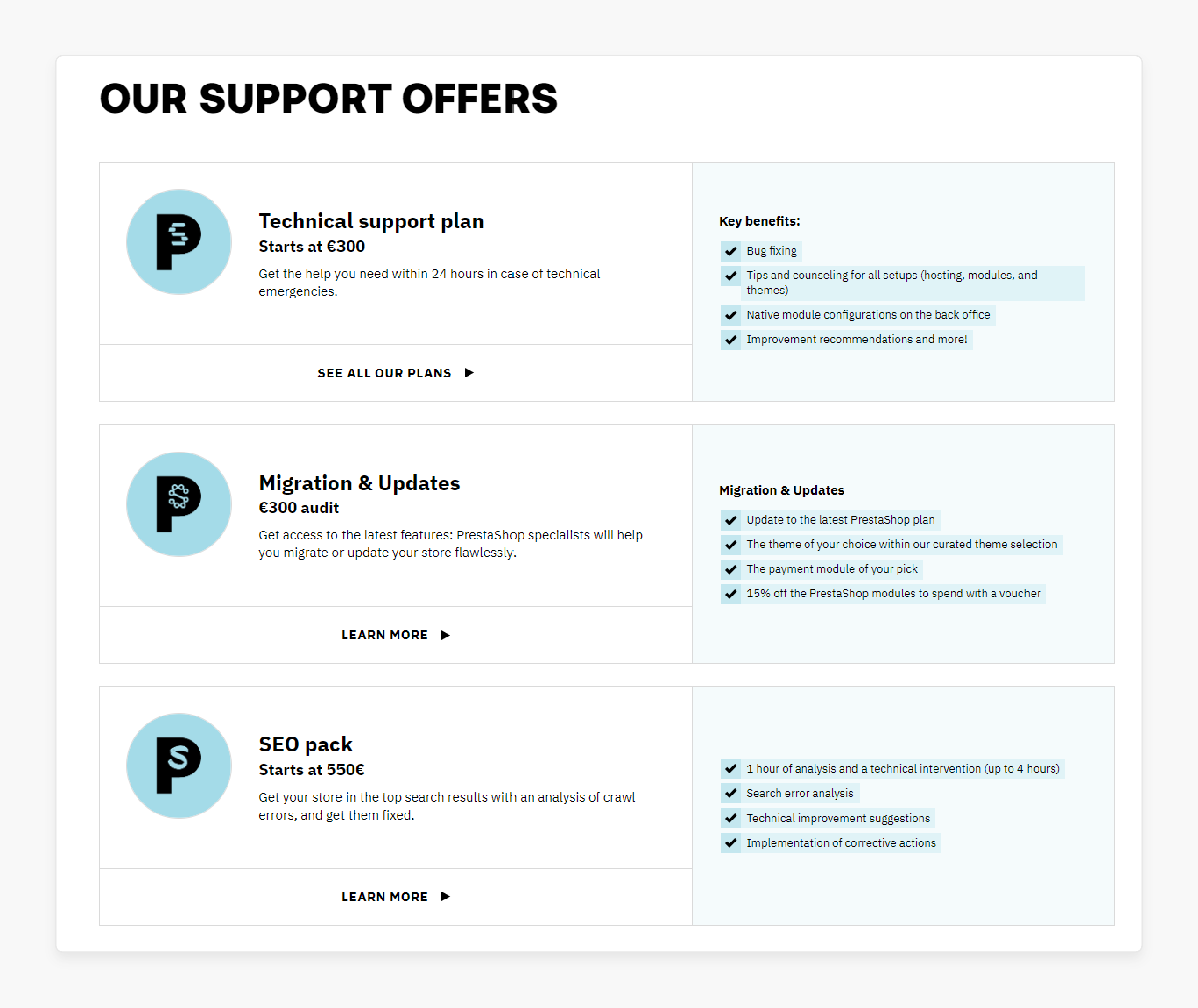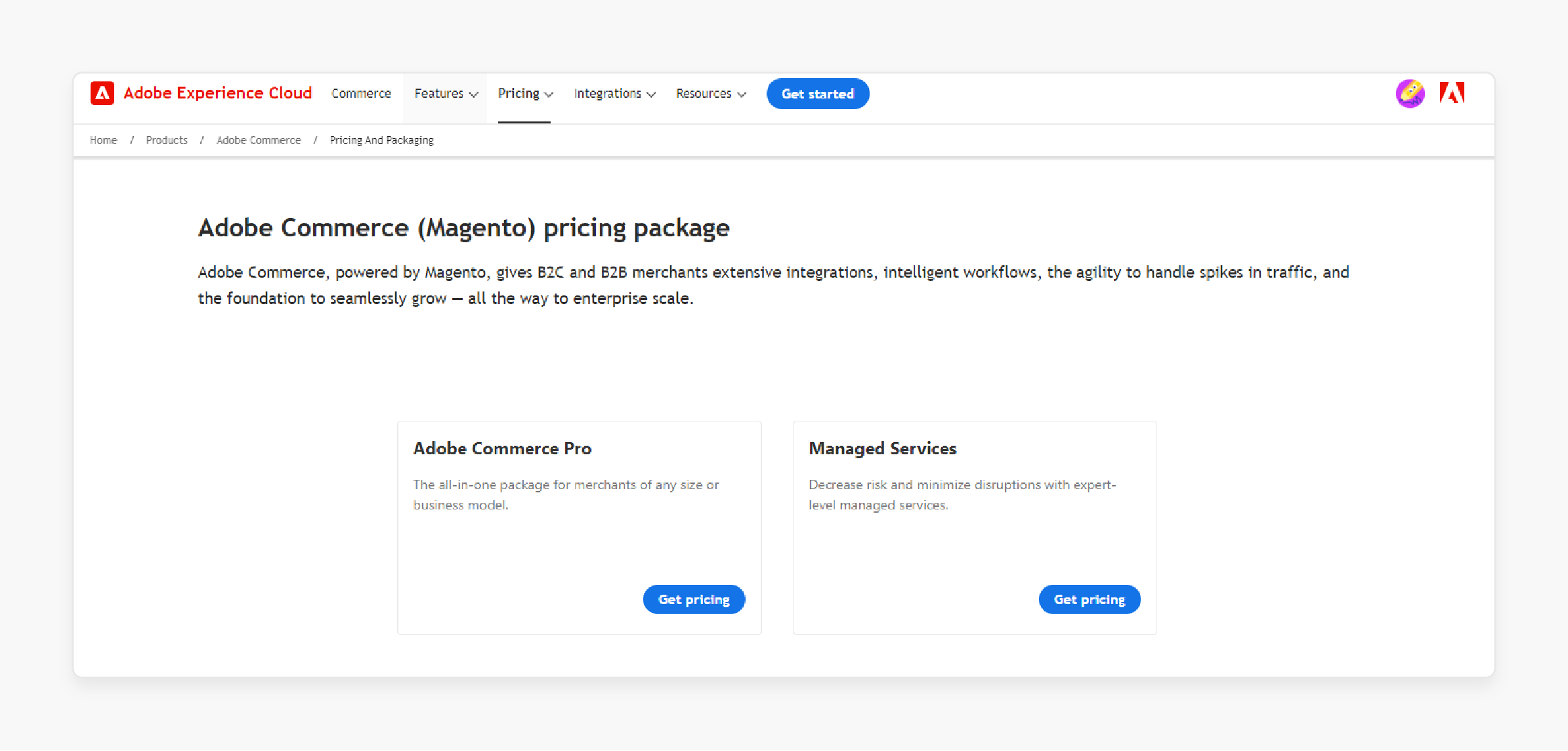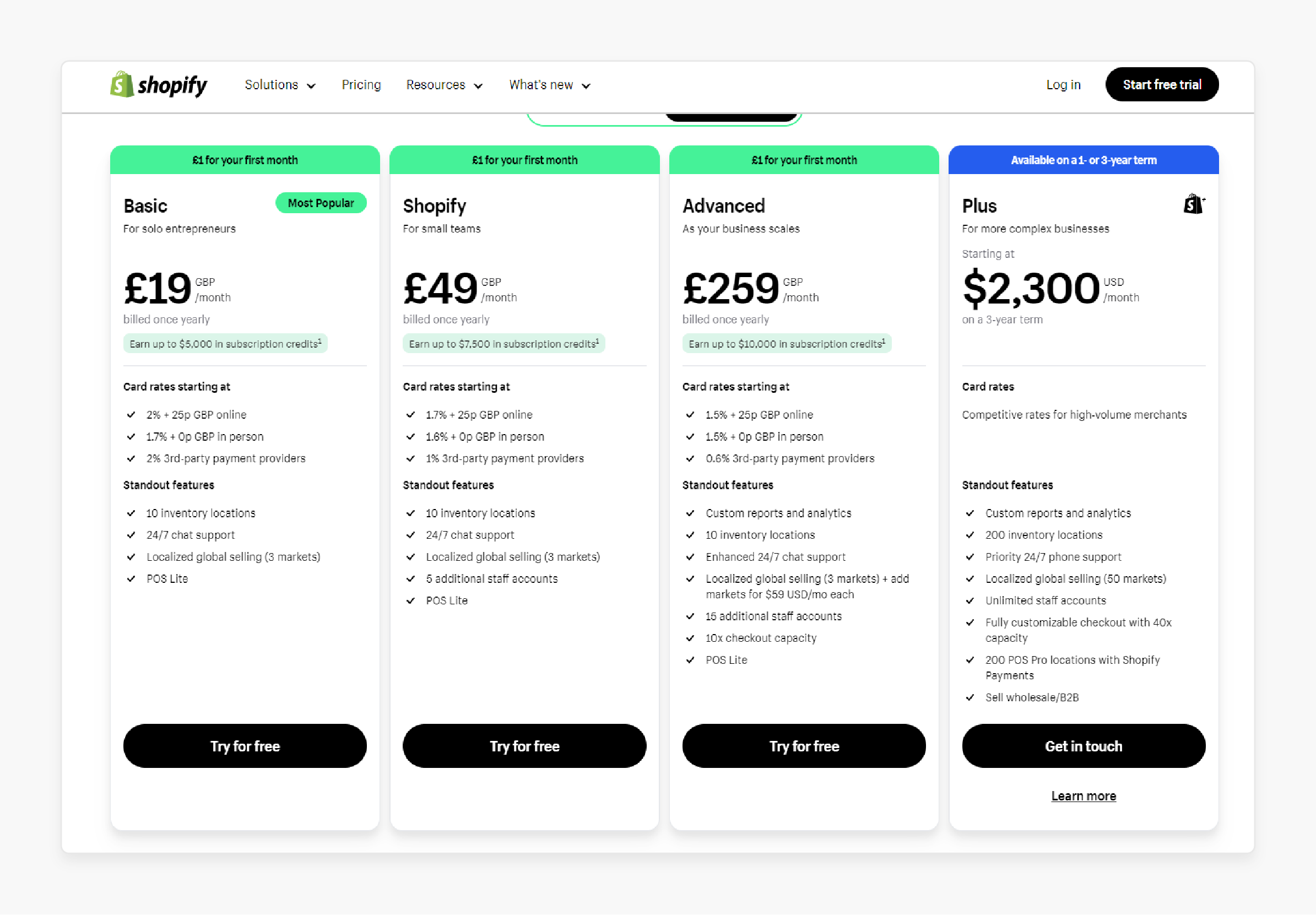
Magento vs. Prestashop vs. Shopify: Which Ecommerce is Best?
Are you wondering which ecommerce platform is best for your online store? Magento vs. Prestashop vs. Shopify are three popular options for your business. Choosing the right ecommerce platform is important for your online store's success.
This article will compare Magento vs. Prestashop vs. Shopify to help you decide.
Key Takeaways
-
What are the aspects of Magento, Prestashop, and Shopify?
-
Key features of Magento Commerce, Prestashop, and Shopify are outlined for ecommerce success.
-
Simple factors to consider when choosing the right platform between the three platforms.
-
Detailed Comparison of Magento with Prestashop and Shopify highlights the differences.
-
The pros and cons of Prestashop, Magento Open Source, and Shopify to understand.
-
Different pricing plans for ecommerce users between- Shopify, Magento, and Prestashop.
-
Reasons to choose the best e-commerce platform for your business and advanced features.
-
Features of Magento vs. Prestashop vs. Shopify in Ecommerce Platform
-
Factors to Consider When Choosing Magento vs. Prestashop vs. Shopify
-
Which E-Commerce Platform Is Best for Your Business? Magento vs Prestashop vs. Shopify
Definitions of Magento vs. Prestashop vs. Shopify
1. What is Magento?

Magento is a powerful open-source platform. It helps businesses build and manage online stores. Magento is known for its customization and scalability.
Magento was released in 2008. It was acquired by Adobe Inc. in 2018. Magento offers better performance, security, and ease of use. Compared to Prestashop, Shopify, or other platforms (like WooCommerce), Magento is more feature-rich. It is popular with both small businesses and large enterprises.
Magento excels in customization, with many Magento themes and extensions that enhance functionality. Magento provides a strong community and offers free support via forums and documentation.
2. What is Prestashop?

Prestashop is an open-source platform that helps to create and manage online stores. It is free to use and ideal for small to medium-sized businesses.
PrestaShop was founded in 2007. It is written in PHP and uses MySQL for database management. PrestaShop offers customization options for entrepreneurs and online retailers. It integrates well with other platforms and offers a Prestashop checkout solution.
PrestaShop is free to download and released under the Open Software License (OSL). It is a good choice for flexibility without the complexity of platforms like Magento.
3. What is Shopify?

Shopify is a hosted e-commerce platform known for its ease of use. It is popular for businesses that want to avoid the hassle of self-hosting.
Shopify was founded in 2006 and is a cloud-based, all-in-one e-commerce solution. It offers a user-friendly interface, many features, and a strong app ecosystem. Unlike Prestashop and Magento, which are open-source and require more technical skills. Shopify provides a fully hosted solution and does not require any technical expertise.
Features of Magento vs. Prestashop vs. Shopify in Ecommerce Platform
1. Store Management
-
Magento: Provides advanced store management and controls multiple websites and stores. All the data management is done from one admin panel. Users can set roles and permissions to manage access easily.
-
Prestashop: Provides an easy back-office for managing products, orders, customers, and content. It supports multiple languages and currencies, making it flexible for global stores.
-
Shopify: Makes setting up and managing an online store simple. It uses a user-friendly interface to handle hosting, security, and updates automatically.
2. Product Management
-
Magento: Offers advanced product management, supporting simple, configurable, bundled, grouped, and downloadable products. Magento ecommerce allows unlimited product attributes and advanced pricing rules.
-
Prestashop: Offers basic to moderate product management, including product listings, inventory, and suppliers. Prestashop themes help customize product pages for their users.
-
Shopify: Offers easy product management with options for variants, inventory, and shipping. It has a simple interface for importing and exporting products for ecommerce.
3. Customization
-
Magento: Highly customizable with full access to the source code. Magento commerce edition offers flexibility and many extensions, but it requires technical expertise.
-
Prestashop: It is a good option for customization, with access to the source code. It has many modules and Prestashop themes to extend functionality and design.
-
Shopify: Customization is more limited. Shopify offers a theme editor and app store to add features, but the core code cannot be modified.
4. SEO Features
-
Magento: Known for strong SEO features, like customizable URLs, meta tags, and sitemaps. Magento ecommerce offers advanced options like layered navigation and canonical tags.
-
Prestashop: Suitable for SEO, with options to edit meta titles, descriptions, and URLs. Prestashop provides an SEO guide and checklist, though some features may need extra modules.
-
Shopify: Suitable for basic SEO features, like editable page titles and meta descriptions. It generates sitemaps automatically, with more options available through apps.
5. Marketing and Promotions
-
Magento: Offers advanced marketing features, like upsells and cross-sells, discounts, and newsletters. Magento integrates with major email marketing platforms.
-
Prestashop: Offers built-in marketing features like promotions, coupons, and email. However, it often relies on third-party modules for more advanced tools.
-
Shopify: Offers marketing tools for abandoned carts, email campaigns, and gift cards. It provides a marketing dashboard to create and manage campaigns.
6. Payment and Shipping
-
Magento: Integrates with payment gateways and offers flexible shipping options, supporting major carriers. Magento provides multi-warehouse inventory management.
-
Prestashop: Integrates with popular payment methods and major shipping carriers. Prestashop allows for setting flexible shipping rules and managing logistics efficiently.
-
Shopify: Fully integrated payment solutions with Shopify Payments. It supports third-party payment providers and offers real-time shipping rates from major carriers.
Factors to Consider When Choosing Magento vs. Prestashop vs. Shopify
| Factors | Magento | Prestashop | Shopify |
|---|---|---|---|
| Budget and Cost | Free, open-source version, but high costs for hosting, development, and maintenance. | Free to use, but costs for hosting, themes, modules, and development can add up. | Subscription model with additional costs for themes, apps, and transaction fees. |
| Hosting and Security | Self-hosted; you manage hosting, security, and maintenance. | Self-hosted; you manage hosting, security, and updates. | Fully-hosted platform; Shopify handles hosting, security, and maintenance. |
| Technical Expertise | Requires the most technical expertise; steep learning curve. | Easier than Magento but requires some technical knowledge for customizations. | Designed for simplicity, minimal technical skills are needed. |
| SEO and Marketing | Strong SEO capabilities with advanced options out-of-the-box. | Solid SEO tools and marketing features; some advanced options require additional modules. | Basic SEO features and marketing tools; easy to use but less customizable. |
| Scalability and Growth | Built for scalability, ideal for enterprise-level businesses. | Suitable for small to medium businesses, it may need optimization as it grows. | Scales with business size may face limitations with extensive customizations. |
| Support and Community | Large, active community with free support via forums. Magento has paid support available for enterprise users. | Strong community with forums and advisors, but not as extensive as Magento. | 24/7 customer support with a large, active community providing many user-generated resources. |
| Customization | Offers the most flexibility with full customization capabilities. | Good customization options with a large library of modules and themes. | Simplified customization with a theme editor and app store but limited control. |
| Overall Suitability | Best for businesses needing extensive customization and willing to invest in technical expertise. | A better option for those seeking control and customization without Magento's complexity. | Ideal for those looking for a simple and quick setup. Shopify is especially for users familiar with WordPress. |
Magento vs Prestashop vs Shopify: Detailed Key Differences
| Platform | Magento | Prestashop | Shopify |
|---|---|---|---|
| Hosting | Self-Hosted | Self-Hosted | Hosted by Platform |
| Features | Extensive built-in features, a large marketplace for extensions | Good built-in features, a large library of modules | Comprehensive built-in features, extensive app store |
| Ease of Use | Complex requires technical expertise | Moderate, some technical knowledge is needed | User-friendly, minimal technical skills required |
| Best Suited For | Medium to large enterprises with complex needs | Small to medium businesses looking for customization and affordability | Businesses of all sizes prioritize ease of use and an all-in-one solution |
| Themes | Limited free and paid themes are available | Limited free themes, a variety of paid themes | Good range of free and paid themes |
| Apps/Extensions | Extension Marketplace | Add-Ons Marketplace | Extensive number of apps |
| Customization | Highly customizable, full access to source code | Customizable access to source code | Moderate customization, limited access to theme code |
| Payment Gateways | Built-in integration with PayPal and Braintree | Supports popular payment methods | Integrated Shopify Payments, plus support for 100+ third-party payment providers |
| Sell Worldwide | Highly scalable for international markets | Supports multi-store functionality | Sell worldwide includes international domains for Shopify. |
| SEO | Advanced SEO features and customization | Good SEO features. Some require additional modules | Comprehensive built-in SEO features, advanced options through apps |
| Customer Support | Community-driven support (open-source), paid support available (enterprise version) | Community support, paid support through plans | 24/7 support via phone, email, and live chat |
| Email Marketing Tools | Advanced tools available through extensions | Basic tools and advanced options require modules | Built-in tools and integrations with major platforms |
Pros and Cons of Prestashop vs. Magento vs. Shopify
1. Prestashop
Pros:
-
Prestashop is a good choice with a user-friendly interface and easy to set up and manage.
-
It offers many free and paid themes and modules available in the market.
-
Prestashop website supports multiple languages and currencies out-of-the-box.
-
Built-in SEO features, ideal for prestashop store owners.
-
Prestashop is suitable for small to medium-sized businesses.
-
Prestashop is open-source, leading to lower setup costs compared in terms of expenses.
Cons:
-
Limited scalability for growing businesses compared to Magento.
-
Prestashop requires some technical knowledge for advanced customization.
-
Add-ons and modules can get expensive over time as available in the market.
-
Prestashop would lack some advanced features that Magento offers out-of-the-box.
-
Relies on third-party hosting and maintenance, so users need to host Prestashop themselves.
2. Magento
Pros:
-
Magento 2 is highly flexible and customizable, perfect for complex needs.
-
Handles large product catalogs management and high sales volumes. It is ideal for big Magento 2 stores.
-
Magento offers many built-in e-commerce features.
-
Strong SEO capabilities with advanced options available in Magento.
-
Scalable for large enterprises like Magento enterprise.
-
Supported by an active Magento community and a large marketplace for extensions offered by Magento.
Cons:
-
Requires Technical Expertise: Magento needs some technical skills. However, with training and support, your team can effectively use its features.
-
High Development and Maintenance Costs: Development and upkeep can be expensive. But it reflects Magento’s strong capabilities. Professional help can manage these costs.
-
Needs Enhanced Hosting: Magento needs powerful hosting, which can be costly. It ensures better performance and reliability, making the investment worth it.
-
Complex for Small Businesses: Magento might seem too complex for smaller businesses. However, its features support growth, so it can scale as your business grows.
-
Fewer Free Themes and Extensions: Magento has fewer free themes and extensions. But the paid options are often higher quality. Investing in them can make your store stand out.
3. Shopify
Pros:
-
Shopify is very user-friendly and great for beginners.
-
Fully hosted, so you don’t need to manage infrastructure with Shopify account.
-
Shopify offers a large app store to add features store with Shopify.
-
Secure and reliable, with built-in SSL and PCI compliance. Shopify also provides strong security.
-
Excellent support and easy-to-follow documentation were available in Shopify.
-
Clear pricing plans with no hidden fees in comparison to Magento.
Cons:
-
Limited customization compared to Prestashop or Magento, with no access to core code.
-
Shopify also charges transaction fees if you use external payment gateways.
-
Not ideal for large catalogs or complex products, unlike Magento and Woocommerce.
-
Migrating from Shopify can be tough, so choose Shopify carefully.
Magento vs Prestashop vs Shopify: Pricing Plans
1. Prestashop

Prestashop plans offer:
-
Technical Support Plans:
-
Support Level 1 (easy): Starts at €300
-
Support Level 2 (essential): €500
-
Support level 3 (premium): €900
-
Support Level 4 (deluxe): €1500
-
-
Migration & Updates: €300
-
SEO Pack: Starts at €550
-
Performance pack: Starts at €90
-
Security pack: Starts €900
-
Removing Malware and secure account: €1990
-
Securing Prestashop store: €1490
-
2. Magento

-
Magento Open Source: Free
-
Magento Commerce: $24,000+/year
-
Magento Commerce Cloud: $32,000+/year
3. Shopify

Shopify offers four pricing options:
-
Basic (for solo entrepreneurs): £25 per month.
-
Shopify (for small teams): £64 per month.
-
Advanced (as per business needs): £344 per month.
-
Shopify Plus (for more complex businesses): $2,300 per month.
Which E-Commerce Platform Is Best for Your Business? Magento vs Prestashop vs. Shopify
1. Magento
Best For:
-
Large Businesses: Magento is great for businesses with large product catalogs and high sales. It is built to scale and handle complex needs.
-
Customization: Magento offers unmatched flexibility. You can customize almost every aspect of your store.
-
Advanced Features: Magento in terms of built-in features, is strong. It is perfect for businesses needing advanced functionality out of the box.
Challenges:
-
Technical Requirements: Using Magento needs technical knowledge. It can be complex to set up and manage.
-
Higher Costs: Running a Magento store can be expensive. It might be due to hosting, development, and maintenance.
2. Prestashop
Best For:
-
Small to Medium Businesses: Prestashop is a better option for an affordable solution. It is ideal for businesses needing good customization without enterprise-level needs.
-
Global Reach: Prestashop offers strong support for multiple languages and currencies. It is perfect for international businesses.
-
Balance of Flexibility and Ease: Prestashop also gives a good mix of flexibility and ease of use. It is easier to manage than Magento but still allows for significant customization.
Challenges:
-
Scalability: Prestashop is suitable for smaller businesses. It may struggle as your business grows.
-
Moderate Technical Skills Needed: Prestashop requires some technical knowledge for more advanced customizations.
3. Shopify
Best For:
-
Ease of Use: Shopify is user-friendly. It is ideal for beginners or those who do not want to deal with technical details.
-
All-in-One Solution: Shopify also handles everything from hosting to security. It makes it a simple and hassle-free option for the users.
-
Quick Setup: Shopify offers a wide range of apps. You can quickly integrate third-party tools without much technical know-how.
Challenges:
-
Limited Customization: Compared to Magento vs Woocommerce or Prestashop, Shopify. It gives less control over your store’s customization.
-
Costs Can Add Up: Shopify has clear pricing. Extra costs can arise from transaction fees and paid apps.
FAQs
1. How does Prestashop compare to Magento in customization and features?
In a vs Prestashop comparison, Magento offers more customization and features out-of-the-box. Prestashop also allows customization but is better for small to medium stores. Yet the functionality Magento offers suits larger businesses.
2. Why consider Shopify vs Magento vs Prestashop?
Shopify vs Magento and Prestashop is best for a fully hosted, easy-to-use platform. Magento enables full customization for your online store. Prestashop is a good choice for a balance between customization and ease of use.
3. What support can I expect from Prestashop vs Magento?
Prestashop support includes forums and Prestashop advisors for paid help. Magento offers free support via its community and paid support for enterprise users. Magento fixes often need professional help.
4. What are the benefits of using Magento over Prestashop or Shopify?
Magento offers enhanced features, scalability, and flexibility, ideal for large businesses. Yet the functionality of Magento is superior to Prestashop or Shopify.
5. How does Magento’s marketplace compare to Prestashop?
Magento marketplace has many extensions for advanced functions. Prestashop offers plugins, but Magento offers free support via its community. Prestashop also has a good selection but is more limited.
6. Can I run a Prestashop store without much technical knowledge?
You can run a Prestashop store with basic technical skills. However, for more advanced features, some technical knowledge is useful. Magento provides more complex tools and needs more expertise than Prestashop.
Summary
Magento vs. Prestashop vs. Shopify are three popular options for your business. Magento excels in customization for large enterprises. It has a flexible architecture and advanced product management capabilities. Prestashop offers a balance of flexibility for small to medium businesses. Shopify provides a fully hosted solution for businesses of all sizes.
Consider the following while selecting the best ecommerce for your business:
-
Choose Prestashop if you need an affordable, flexible platform with moderate customization.
-
Choose Magento if you run a large enterprise needing extensive customization and scalability.
-
Choose Shopify if you prefer a simple, fully hosted platform with a quick setup. It has minimal technical requirements.
Explore Magento Hosting Plans to find the best fit for your e-commerce business needs.







